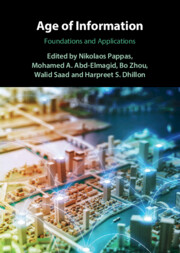Book contents
- Frontmatter
- Contents
- Contributors
- Acknowledgments
- 1 The Probability Distribution of the Age of Information
- 2 On the Distribution of AoI
- 3 Multisource Queueing Models
- 4 Controlling the Age of Information: Buffer Size, Deadlines, and Packet Management
- 5 Timely Status Updating via Packet Management in Multisource Systems
- 6 Age of Information in Source Coding
- 7 Sampling and Scheduling for Minimizing Age of Information of Multiple Sources
- 8 Age-Efficient Scheduling in Communication Networks
- 9 Age-Driven Transmission Scheduling in Wireless Networks
- 10 Age of Information and Remote Estimation
- 11 Relation between Value and Age of Information in Feedback Control
- 12 Age of Information in Practice
- 13 Reinforcement Learning for Minimizing Age of Information over Wireless Links
- 14 Information Freshness in Large-Scale Wireless Networks: A Stochastic Geometry Approach
- 15 The Age of Channel State Information
- 16 Transmission Preemption for Information Freshness Optimization
- 17 Economics of Fresh Data Trading
- 18 UAV-Assisted Status Updates
- Index
17 - Economics of Fresh Data Trading
Published online by Cambridge University Press: 02 February 2023
- Frontmatter
- Contents
- Contributors
- Acknowledgments
- 1 The Probability Distribution of the Age of Information
- 2 On the Distribution of AoI
- 3 Multisource Queueing Models
- 4 Controlling the Age of Information: Buffer Size, Deadlines, and Packet Management
- 5 Timely Status Updating via Packet Management in Multisource Systems
- 6 Age of Information in Source Coding
- 7 Sampling and Scheduling for Minimizing Age of Information of Multiple Sources
- 8 Age-Efficient Scheduling in Communication Networks
- 9 Age-Driven Transmission Scheduling in Wireless Networks
- 10 Age of Information and Remote Estimation
- 11 Relation between Value and Age of Information in Feedback Control
- 12 Age of Information in Practice
- 13 Reinforcement Learning for Minimizing Age of Information over Wireless Links
- 14 Information Freshness in Large-Scale Wireless Networks: A Stochastic Geometry Approach
- 15 The Age of Channel State Information
- 16 Transmission Preemption for Information Freshness Optimization
- 17 Economics of Fresh Data Trading
- 18 UAV-Assisted Status Updates
- Index
Summary
In this chapter, we study the economic issues of fresh data trading markets, where the data freshness is captured by Age-of-Information (AoI). In our model, a destination user requests, and pays for, fresh data updates from a source provider. In this work, the destination incurs an age-related cost, modeled as a general increasing function of the AoI. To understand economic viability and profitability of fresh data markets, we consider a pricing mechanism to maximize the source’s profit, while the destination chooses a data update schedule to trade off its payments to the source and its age-related cost. The problem is exacerbated when the source has incomplete information regarding the destination’s age-related cost, which requires one to exploit (economic) mechanism design to induce the truthful information. This chapter attempts to build such a fresh data trading framework that centers around the following two key questions: (a) How should a source choose the pricing scheme to maximize its profit in a fresh data market under complete market information? (b) Under incomplete information, how should a source design an optimal mechanism to maximize its profit while ensuring the destination’s truthful report of its age-related cost information?
- Type
- Chapter
- Information
- Age of InformationFoundations and Applications, pp. 429 - 455Publisher: Cambridge University PressPrint publication year: 2023
- 1
- Cited by

